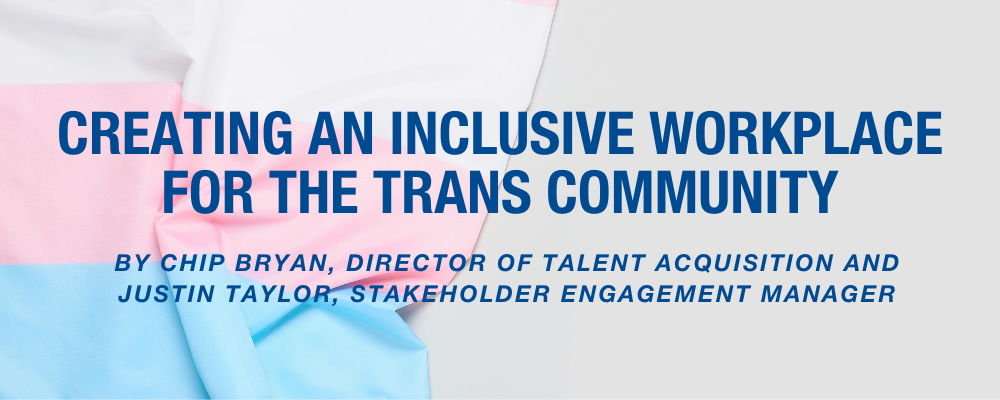
Creating an Inclusive Workplace for the Trans Community

By: Chip Bryan, Director of Talent Acquisition & Justin Taylor, Stakeholder Engagement Manager
One of our shared purpose statements here at Goodwill Industries of the Southern Piedmont is that “everyone and everything matters.” And we believe that to our core. We are committed to serving others with excellence regardless of their background, circumstance, the color of their skin, sexual orientation, gender expression or however they identify.
As we enter Pride Month, it is important for us to recognize that it takes intentional and concerted effort to build an equitable and inclusive workplace that endures. Creating an inclusive workplace for the LGBTQ+ community, specifically for individuals who are transgender, nonbinary and queer is important. While the trans community is often lumped in with the gay, lesbian and bi communities, there is far less representation and understanding about the challenges this population faces in the workplace and their daily lives.
It is important for us to understand these barriers so that employers can do their part to support our LGBTQ+ team members and create an inclusive experience at work.
– Lack of legal protection. The US Supreme Court passed legislation in 2020 to make it clear that trans people are legally protected from workplace discrimination. Unfortunately, instances of discrimination are still prevalent in the workplace and there is still ambiguity around how these protections apply to gender identity. One in four transgender people have lost a job due to bias and discrimination. Three in four transgender people have experienced some form of workplace discrimination or harassment.
– Poverty and homelessness. Approximately 29% of transgender adults live in poverty, with that percentage weighing in significantly higher for trans people of color. Stigma, discrimination, and violence against trans individuals has a significant impact on productivity in the workplace. Levels of violence against trans individuals has been at a record high over the past several years, specifically against black trans women. Also, trans men often face disproportionate levels abuse from their significant others.
– Lack of healthcare coverage. One in three trans adults have been refused health care by a provider due to their gender identity and many trans individuals avoid medical care completely due to past negative experiences.
– Identity documents. Think about what a pain it is to renew your passport, replace your social security card, or make changes to your bank accounts after getting married. Now think about how challenging that would be if you had to update all these documents with the correct name and/or gender marker. Not only can the process be time-consuming and tedious, but also expensive. Not to mention trans individuals may also face discrimination by the workers whose jobs it is to help people update their documents.
Now that we share some challenges that trans and nonbinary individuals face, organizations can be very intentional about what they can do to provide solutions. Here are some meaningful ways employers can do to support their trans and nonbinary employees:
– Be intentional in your recruitment efforts. Send your job openings to local LGBTQ+ advocacy groups to be shared with the participants they serve. You can also partner with these organizations to provide workshops and seminars focused on essential workforce skills.
– Preferred names. While legal names are required for payroll and certain benefits, that name should be kept confidential and there is no reason others on the team should know your team member as anything other than how they have identified themselves.
– Ensure your employee assistance programs have counselors trained to address LGBTQ+ issues. When faced with the challenges previously mentioned, it is not uncommon for individuals to turn to substance abuse, social isolation and have a negative self-image. They can benefit from the support offered by these programs, but only if the staff providing EAP counseling is well versed in issues specific to the LGTBQ+ community.
– Recognize Pride month as part of your DEI initiatives. It’s an important month of recognition for the promotion of self-affirmation, dignity, equality, acceptance and increased visibility for members of the LGBTQ+ community. It’s a time to celebrate and recognize the accomplishments of the LGBTQ+ community, as well as a time to commemorate years of struggle for civil rights and the ongoing pursuit of equity.
– Create inclusive anti-discrimination and dress code policies. Amend your anti-discrimination statement to include gender identity and review or modernize your company dress code to eliminate gender-specific language. It would be a good idea to make sure your team member handbook uses gender-neutral language.
– Incorporate pronouns in your email signature. This shows that you care about an individual’s preferences and is a simple solution to accidental misgendering. It also helps normalize discussions and understanding about gender rather than it being this taboo topic of conversation. While discussing pronouns may make some cisgender team members uncomfortable at first, it provides an opportunity for you as an employer to educate and reinforce appreciation for all team members. Also, if you do slip up and refer to someone by the wrong pronoun, simply apologize and move on rather than making a big deal.
– Inclusive healthcare options. Make your organization a progressive leader by examining queer and trans healthcare or insurance providers. Identify healthcare plans that cover gender-affirmative surgery, hormone therapy and strong mental healthcare support as the transgender community experiences significantly higher rates of depression, anxiety and suicide.
– Gender-neutral restrooms. Create gender-neutral restrooms in the workplace, thus creating a safe space for your team members to perform a basic bodily function without drawing any unnecessary attention to gender identity.
– Ensure that your DEI training includes LGBTQ+ inclusive practices. You also want to be aware of not singling anyone out or having a ‘token trans person’ who is expected to educate the rest of the company or organization on gender identity and trans-specific issues. It is not their responsibility to educate you. Be sure that the training includes examples of gender diversity and provides examples of how anti-harassment and anti-discrimination policies relate to the trans community.
At Goodwill, our vision is to create a community where equitable access to career opportunities is available for all. Honoring this vision, and creating an equitable workplace, takes all of us working together, being honest about the effects of systemic issues and other inequities experienced by members of the LGBTQ+ community, specifically for trans and nonbinary individuals. We all should be working to build an equitable and inclusive workplace year-round.


